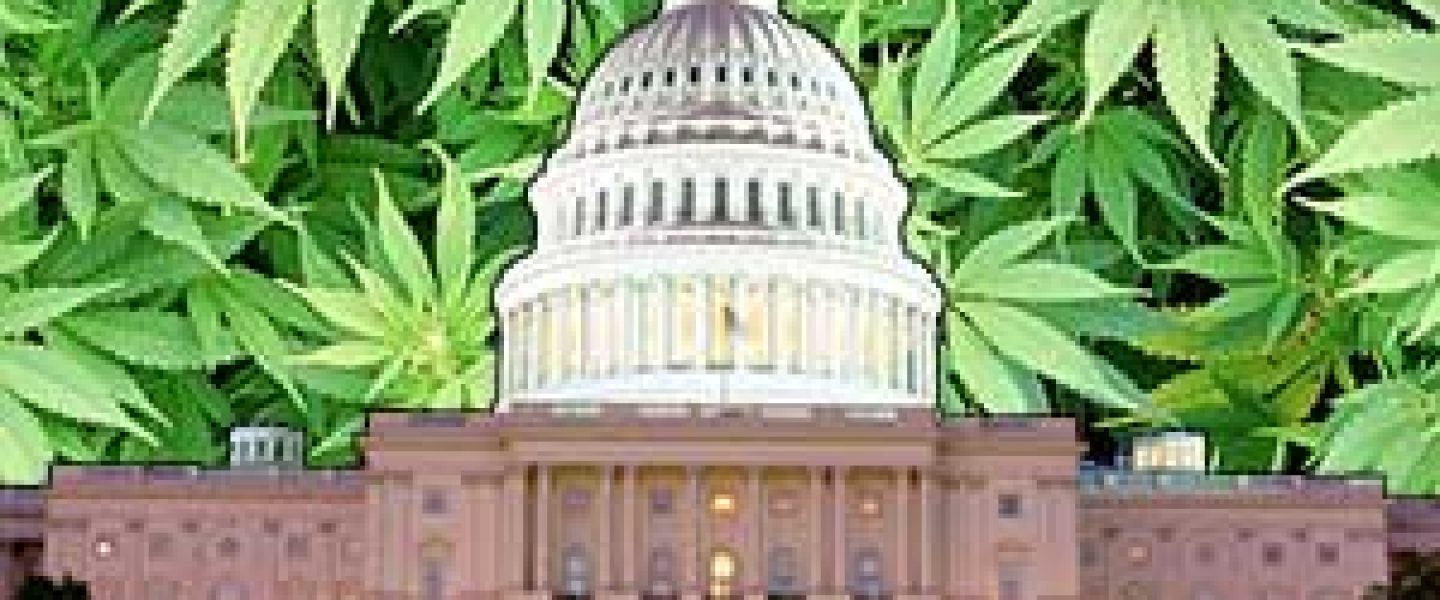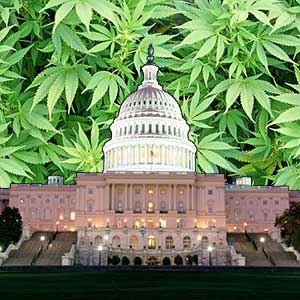The Senate Judiciary Committee Tuesday afternoon held a hearing on marijuana legalization and conflicts between state and federal marijuana laws. Led by committee Chairman Sen. Patrick Leahy (D-VT), the hearing featured testimony from the deputy attorney general who has set Justice Department policy, two officials in states that have legalized marijuana and one critic of marijuana legalization.
The hearing marked the first time Congress has grappled with the issue of responding to state-level marijuana legalization and was notable for its emphasis on making legalization work in states where it is legal. It was also notable in that of all the senators present, only one, Sen. Charles Grassley (R-IA), bothered to dredge up the sort of anti-marijuana rhetoric that had in years and decades past been so typical on Capitol Hill.
“Marijuana is a dangerous and addictive drug,” said Grassley, who turns 80 next week. “It’s illegal under international law as well, and the treaty requires us to restrict its use to scientific and medical uses. These [legalization] laws flatly contradict our federal law. Some experts fear a Big Marijuana, a Starbucks of marijuana,” he lamented.
Grassley’s lonely stand reflects changing political realities around marijuana policy. The other senators who spoke up during the hearing — Democrats Leahy, Richard Blumenthal of Connecticut, and Sheldon Whitehouse of Rhode Island — all represent states where voters have already expressed support for medical marijuana and a region where support for outright legalization is high. They were all more interested in removing obstacles to a workable legalization than in turning back the clock.
“Last November, the people of Colorado and Washington voted to legalize marijuana, and these new laws are just the latest example of the growing tension between state and federal marijuana laws and the uncertainty about how such conflicts are resolved,” Leahy said as he opened the hearing. “Marijuana use in this country is nothing new, but the way in which individual states deal with it continues to evolve. We all agree on the necessity of preventing distribution to minors, on preventing criminal enterprises from profiting, and on drugged driving. But I hope that there might also be agreement that we can’t be satisfied with the status quo.”
The first witness was Deputy Attorney General James Cole, author of last month’s policy directive notifying state governments that the Justice Department would not seek to preempt their marijuana laws and instructing all federal prosecutors to leave legal marijuana alone — with a number of exceptions. Sales to minors, the use of guns or violence, profiting by criminal groups, a marked increase in public health consequences like drugged driving, and distribution of marijuana into non-legal states are all among the factors that could excite a federal response, Cole’s directive noted.
On Tuesday, Cole reiterated and went over the policy directive for senators, but the most striking part of his testimony was his admission that the federal government could not effectively put the genie back in the bottle.
“It would be very challenging to preempt decriminalization,” Cole conceded in response to a question from Leahy. “We might have an easier time preempting the regulatory scheme, but then what do you have? Legal marijuana and no enforcement mechanism, which is probably not a good situation. You would also have money going to organized criminal enterprises instead of state coffers.”
The three Democratic senators all prodded Cole and the Justice Department to do something about the legal marijuana (and medical marijuana) industry’s problems with banks and financial services. Because of federal pressure, such institutions have refused to deal with marijuana, leaving those businesses drowning in cash. The senators also questioned reports that the DEA had been telling armored car companies not to do business with marijuana businesses.
“What about the banking industry?” asked Leahy. “A cash only business is a prescription for problems. We’re hearing that DEA agents are instructing armored car companies to stop providing services to medical marijuana companies. It’s almost as if they’re saying ‘let’s see if we can have some robberies.’ What is the department going to do to address those concerns?”
“The governors of Colorado and Washington raised this same issue,” Cole acknowledged. “There is a public safety concern when businesses have a lot of cash sitting around; there are guns associated with that. We’re talking with FinCEN and bank regulators to find ways to deal with this in accordance with laws on the books today.”
“There should be specific guidance to the financial services industry,” a not-quite-mollified Leahy replied.
The committee then heard from King County (Seattle), Washington, Sheriff John Urquhart. “The war on drugs has been a failure,” the sheriff said bluntly. “We have not reduced demand, but instead incarcerated a generation of individuals. The citizens decided to try something new. We, the government, failed the people, and they decided to try something new.”
Urquhart saw no great tension between the federal government and legal marijuana states, and he, too, brought up the issue of banking services.
“The reality is we do have complementary goals and values,” Urquhart said. “We all agree we don’t want our children using marijuana. We all agree we don’t want impaired drivers. We all agree we don’t want to continue enriching criminals. I am simply asking that the federal government allow banks to work with legitimate marijuana businesses who are licensed under this new state law.”
The committee also heard from Kevin Sabet of Project SAM (Smart About Marijuana), the voice of 21st Century neo-prohibitionism.
“In states like Colorado,” he said, “we’ve seen medical marijuana cards handed out like candy, we’ve seen mass advertising. At the marijuana festival in Seattle we saw 50,000 people smoking marijuana publicly; it’s the public use of marijuana that worries me. I don’t see the evidence of trying to implement something robust, especially in the face of an industry that will be pushing back against every single provision. In a country with a First Amendment and alcohol and tobacco industries that profit off addiction, I worry that, inevitably, American-style legalization is commercialization, no matter the interests of state officials and regulators.”
But nobody except Grassley seemed to be listening.
Marijuana legalization advocates and drug law reformers liked what they heard Tuesday.
“It feels like there’s a paradigm shift underway in the Justice Department’s interpretation of federal drug control law,” said Ethan Nadelmann, executive director of the Drug Policy Alliance. “They seem to recognize that drug control should be first and foremost about protecting public health and safety, and that smart statewide regulatory systems of the sort that Colorado and Washington are proposing may advance those objectives better than knee-jerk enforcement of federal prohibitions.”
“For years, the legalization movement has been gaining traction as people learn this is neither a fringe issue nor a partisan one, but one responsible for deep inequities in our justice system, the expansion of criminal gangs and the increase in unsolved violent crimes,” said Law Enforcement Against Prohibition (LEAP) board member and former Denver cop Tony Ryan. “There’s a long road ahead, and this hearing leaves many questions unanswered, but this historic discussion means we are on our way to a more rational and effective drug policy.”
“The Department of Justice is finally taking seriously the dangers that a lack of access to simple banking services poses to consumers, employees and business owners,” said Aaron Smith, director of the National Cannabis Industry Association. “We are encouraged that the growing consensus among essentially all stakeholders is that banking access must be available to legal businesses. It portends a quick reform to this dangerous and unnecessary situation.”
“The era of robust state-based regulation is here,” said Bill Piper, director of national affairs for the Drug Policy Alliance. “Legalizing marijuana and shrinking the number of people behind bars in the US is an issue the left and right can join together on. Like the repeal of alcohol prohibition, the repeal of marijuana prohibition will save taxpayer money, put organized crime syndicates out of business, and protect the safety of young people.”
But at a time when marijuana prohibition remains the federal law of the land, perhaps former Seattle police chief and LEAP member Norm Stamper had the most down-to-earth take.
“While I would have liked to have seen a substantive change in policy, what we were really listening to in that hearing was the sound of a changing political climate,” said Stamper. “People who can’t agree on any other political issue are coming together over this one, and politicians on both sides of the aisle ignore that at their own peril.”
Article From StoptheDrugWar.org - Creative Commons Licensing - Donate



























